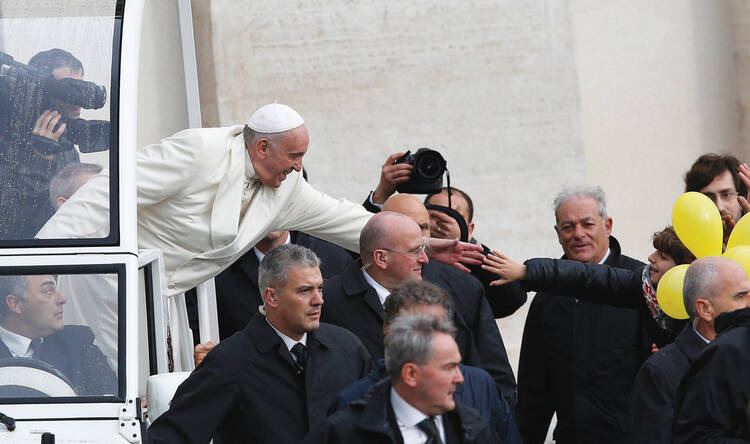Immediately after his election on March 13, 2013, Pope Francis told himself, “Jorge, do not change, continue being yourself because to change at your age would be ridiculous.” He revealed this interesting personal detail in a wide-ranging exclusive multi-part interview with Elisabetta Piquè published in the daily La Nación of Argentina beginning on Dec 7.
Asked why he thought some sectors in the church feel disoriented and assert that today the church is like a ship without a rudder, especially after the recent synod, Francis questioned whether people had really said this. He suggested that part of the problem is that people don’t read what he has written: an encyclical together with Benedict XVI, homilies, declarations and “The Joy of the Gospel.”
“There are always fears,” Pope Francis said, “but [it is] because they don’t read [the texts], or [they] read news in a daily paper, an article. They do not read what the synod decided, what it published.”
Pope Francis pointed out that “nobody spoke about homosexual marriage in the synod, it did not occur to us. What we spoke about was how a family that has a homosexual son or daughter, how can they educate him/her, how can they raise her/him, how can this family be helped to move forward in this situation which is a little unprecedented. So in the synod they spoke about the family and homosexual persons in relation to their families because it is a reality that we encounter many times in the confessional.”
So the synod has to see “how to help this father or this mother who accompanies this son or daughter. That’s what was touched upon in the synod. For this reason someone spoke about positive elements in the first rough draft. But that draft was relative.”
He said he is “not afraid” to follow this process of synodality, that is a journeying together, “because it is the journey that God asks of us. Furthermore, the pope is the guarantor; he is there to take care of this also. So it is necessary to carry on with this.”
The Jesuit pope recalled that in his final speech to the synod he drew attention to the fact that “no point of the doctrine of the church on marriage has been touched.” And in the case of the divorced and remarried, he said, “We raised the question: ‘What can we do with them, what door can be opened?’ It was a pastoral concern: So will they get Communion?”
But, Francis said, “It is not a solution if they go to Communion. This alone is not a solution; the solution is integration. They are not excommunicated, that is true. But they cannot be godparents at baptism, they cannot read the readings in the Mass, they cannot give Communion, they cannot teach catechism, they cannot do some seven things. I have the list here. Stop! If I take account of this, it seems they are excommunicated de-facto,” he remarked.
So the question, he said, is “to open the doors a little bit more.”
All the recent popes have met with resistance at some stage, and now after 20 months, the resistance to Francis that was at first silent and underground has become more evident. Pope Francis considers it “a good sign” that this resistance is ventilated openly, “that they do not speak behind the back when they do not agree. It is healthy to ventilate things, it is very healthy.”
He thinks this resistance is linked to decisions he has taken, “decisions that have touched some economic interests, others more pastoral [ones].” But he is not worried. “It would be abnormal if there were no diverging points of view.” As he moves ahead with clean-up and reform, he feels totally at peace, and remarked, “God is good to me, he has given me a healthy dose of unconsciousness. I keep doing what I must do.”








